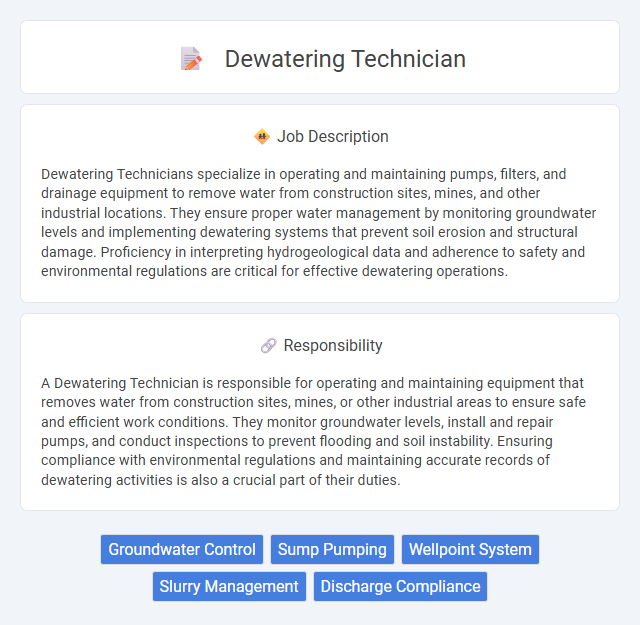
Dewatering Technicians specialize in operating and maintaining pumps, filters, and drainage equipment to remove water from construction sites, mines, and other industrial locations. They ensure proper water management by monitoring groundwater levels and implementing dewatering systems that prevent soil erosion and structural damage. Proficiency in interpreting hydrogeological data and adherence to safety and environmental regulations are critical for effective dewatering operations.
Individuals with strong physical stamina and a willingness to work in outdoor and sometimes harsh environments may be well-suited for a Dewatering Technician role. Candidates who are comfortable with operating heavy machinery and handling potentially hazardous materials will likely find this job aligns with their capabilities. Those who prefer routine office work or have limited exposure to manual labor might find this position less compatible with their skills and preferences.
Qualification
A Dewatering Technician typically requires a high school diploma or equivalent, along with specialized training in groundwater control and water management systems. Proficiency in operating pumps, dewatering equipment, and monitoring site conditions is essential, often supported by certifications such as OSHA safety training or confined space entry. Experience with soil types, hydrogeology principles, and the ability to troubleshoot mechanical failures enhances job performance in construction or environmental projects.
Responsibility
A Dewatering Technician is responsible for operating and maintaining equipment that removes water from construction sites, mines, or other industrial areas to ensure safe and efficient work conditions. They monitor groundwater levels, install and repair pumps, and conduct inspections to prevent flooding and soil instability. Ensuring compliance with environmental regulations and maintaining accurate records of dewatering activities is also a crucial part of their duties.
Benefit
A Dewatering Technician role likely offers the benefit of hands-on experience with advanced water management technologies, enhancing technical skills in environmental and construction settings. The position probably provides opportunities for career growth within industries like civil engineering, mining, and environmental services. Employees may also receive competitive wages and benefits, contributing to overall job satisfaction and long-term stability.
Challenge
Dewatering Technician roles likely involve complex challenges related to managing groundwater control and preventing soil erosion at construction sites. The probability of encountering unpredictable environmental conditions requires quick problem-solving and technical expertise to optimize water removal systems. Handling heavy equipment and ensuring compliance with safety and environmental regulations may also present ongoing challenges in this position.
Career Advancement
Dewatering Technicians gain valuable experience in managing water removal processes on construction sites, which opens pathways to supervisory roles and project management positions within environmental and civil engineering sectors. Mastery of specialized equipment and safety protocols enhances prospects for career growth in hydrogeology and environmental consulting firms. Continuous certification and skill development in water treatment technologies boost opportunities for advancement to senior technician or technical specialist roles.
Key Terms
Groundwater Control
Dewatering Technicians specialize in groundwater control by installing and maintaining systems that remove excess water from construction sites and excavation areas. Their expertise includes operating wellpoints, deep wells, and sump pumps to prevent soil instability and ensure safe, dry working conditions. Mastery in soil permeability analysis and hydrogeological data interpretation is essential for effective groundwater management and contamination prevention.
Sump Pumping
Dewatering Technicians specialize in sump pumping to efficiently remove groundwater and surface water from construction sites, preventing flooding and ensuring structural stability. They operate, maintain, and troubleshoot sump pumps, monitoring water levels and adjusting equipment for optimal performance. Expertise in sediment control and compliance with environmental regulations is crucial for effective water management and site safety.
Wellpoint System
A Dewatering Technician specializing in Wellpoint Systems manages groundwater control by installing and maintaining wellpoint pumps to lower the water table effectively around construction sites. Proficiency in operating submersible pumps, maintaining dewatering pipelines, and monitoring water discharge rates ensures stable excavation conditions and prevents soil saturation. Expertise in soil types and hydraulic principles is critical to optimize system design and ensure compliance with environmental regulations.
Slurry Management
Dewatering technicians specializing in slurry management control the removal of water from slurry mixtures to optimize solids recovery and reduce environmental impact. They operate and maintain dewatering equipment such as centrifuges, filter presses, and vacuum pumps, ensuring efficient separation of solids and liquids. Expertise in chemical dosing, monitoring slurry characteristics, and understanding settling behavior is critical for maximizing throughput and maintaining regulatory compliance.
Discharge Compliance
A Dewatering Technician ensures discharge compliance by monitoring and regulating water removal systems to prevent environmental contamination and adhere to local regulations. They perform routine inspections, collect water samples, and maintain detailed records to verify that discharge parameters meet permitted standards. Proficiency in groundwater control techniques and knowledge of environmental laws are critical for maintaining regulatory compliance and operational safety.
 kuljobs.com
kuljobs.com